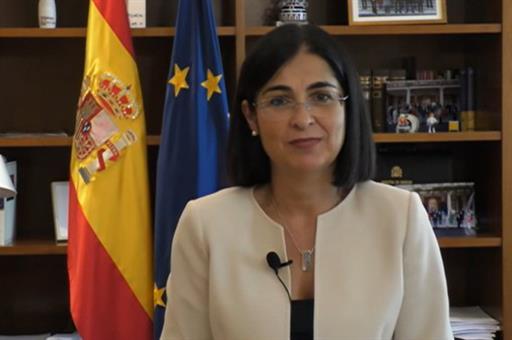Darias: We need strong global healthcare today to protect citizens from future health threats
News - 2021.9.13
This was stated during her speech at the 71st WHO-Euro Regional Committee, in which she underlined the Government of Spain's favourable position in the search for "extraordinary global responses to global health emergencies".
In this regard, the Spanish Minister for Health insisted that "no country and no region will be safe until we are all safe", which is why our country, she recalled, is committed to collaborating with the vaccination process and thus narrowing the existing gap in this area between the so-called global North and South, also in Europe.
Thus, detailed Darias, Spain, in compliance with the commitments expressed by President Sánchez, has already donated more than six million vaccines to Latin America through the COVAX mechanism, and will continue to collaborate with third countries in 2021 to reach the 22.5 million committed.
Multilateralism
The Minister for Health has assured that the Government of Spain wants to promote multilateralism and defend public health in Europe and around the world, supporting the leadership of the World Health Organization in all its areas, especially when it comes to achieving the Sustainable Development Goals (SDGs) of the 2030 Agenda.
In this context, Darias reiterated Spain's commitment to go hand in hand with the World Health Organization (WHO) and the WHO-Europe Regional Committee in promoting healthy living and well being throughout the world, which is why our country is attentive to the discussions on the subject that are taking place in the working group to strengthen the WHO's preparedness and response to health emergencies.
Enhancing resilience
The Spanish Minister for Health has insisted on the need to increase response and resilience capacities, as well as multilateral coordination, in order to leave no one behind, as one of the lessons learned from the SARS-CoV-2 pandemic.
As Carolina Darias underlined, the pandemic has put these capacities to the test and has revealed some structural weaknesses in areas such as epidemiological surveillance or resources for primary care and research. He also showed the risks to global health posed by behaviours such as the nationalisation of vaccines or fake news.
Better prepared for future challenges
However, Darias also drew some positive conclusions from the COVID-19 pandemic. In this sense, she assured that we are now better prepared for future challenges and highlighted the value of the National Health System (NHS); a public and universal system that has been strengthened thanks to continuous improvements that have been implemented.
The Minister for Health recalled how Spain has reached the target of having fully vaccinated 70% of the population in eight months, from the start of the campaign at the end of December 2020.
In this sense, she praised both the National Health System and the commitment of all the health professionals who are part of it and who have made it possible, thanking the doctors and nurses for their work; a key task in the face of a possible social rejection of the vaccine or the anti-vaccine movements in our country.
She also valued the role played by the collaboration between the Government of Spain and regional governments and local entities; a co-governance that has characterised the entire process in the face of the pandemic and in the development of the vaccination campaign, with the Interterritorial Council of the National Health System as a fundamental body.
Non official translation





